50+ Sample Immunization Forms
-
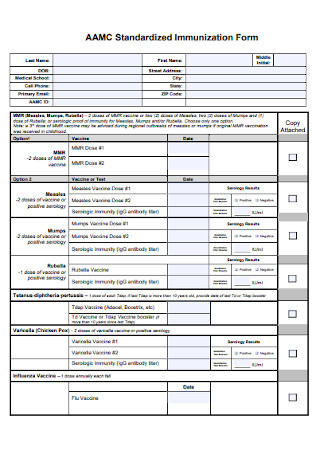
Standardized Immunization Form
download now -
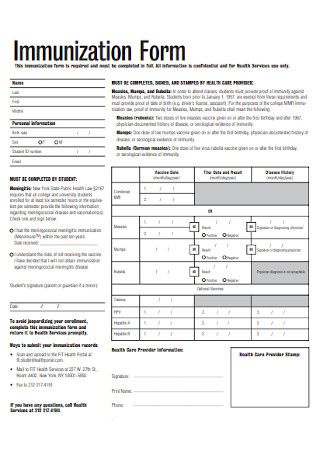
Institution Immunization Form
download now -
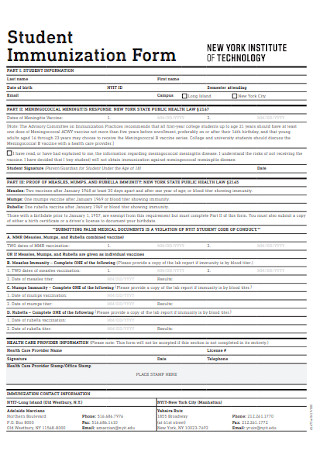
Student Immunization Form
download now -
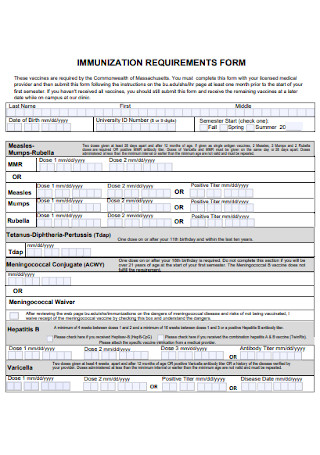
Immunization Requirements Form
download now -
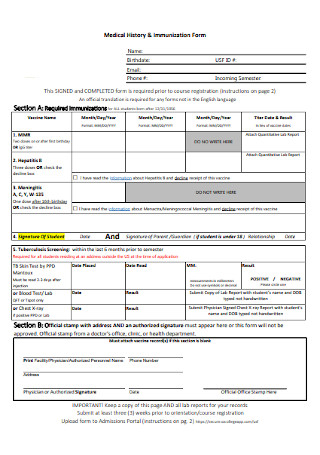
Medical History and Immunization Form
download now -
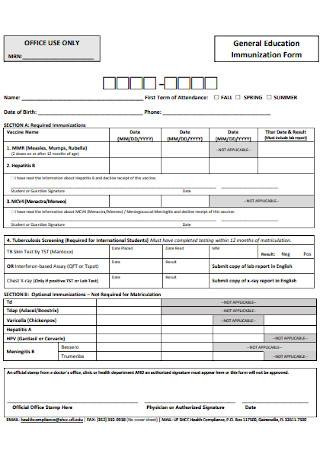
General Education Immunization Form
download now -
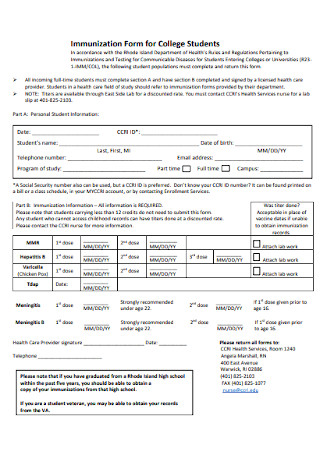
Immunization Form for College Students
download now -
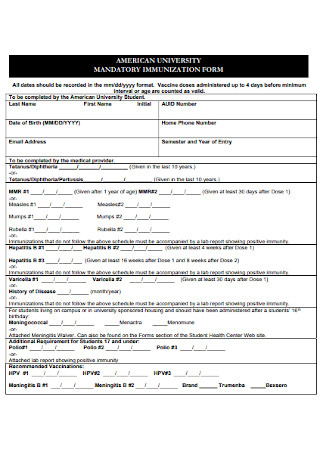
Mandatory Immunization Form
download now -
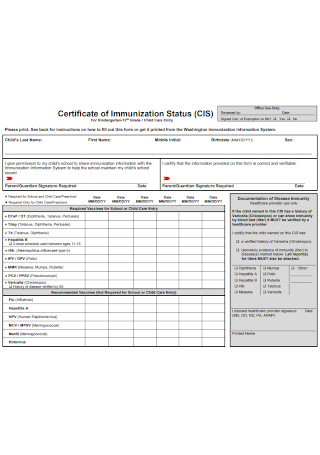
Certificate of Immunization Status Form
download now -
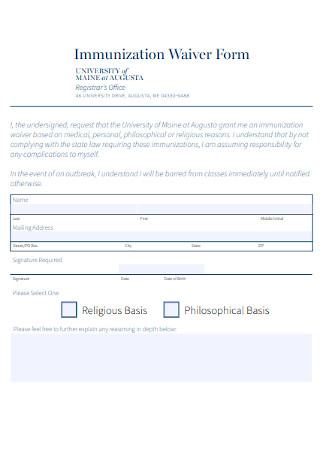
Immunization Waiver Form
download now -

Immunization Form for Non-Healthcare Students
download now -
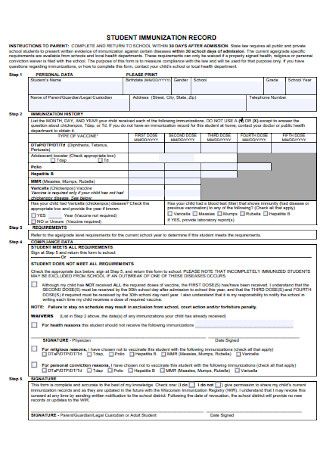
Student Immunization Record Form
download now -
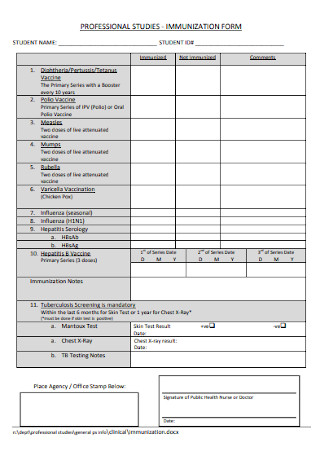
Professional Students Immunization Form
download now -
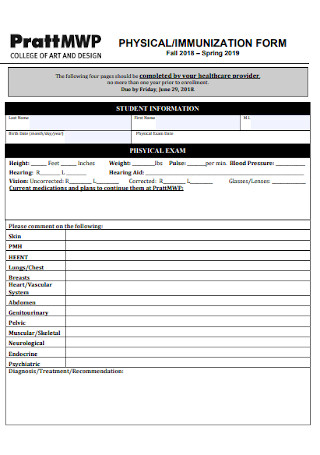
Physical Immunization Form
download now -
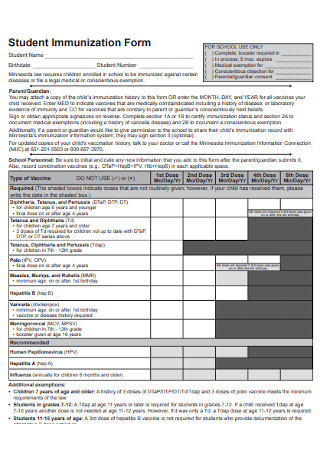
Student Immunization Form Template
download now -
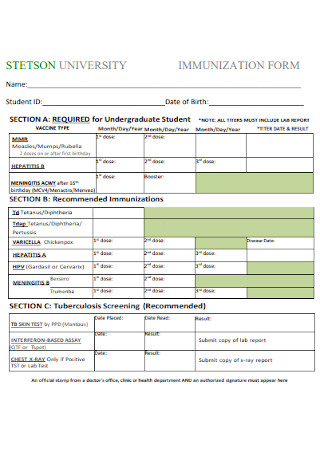
University Immunization Formy Immunization Form
download now -
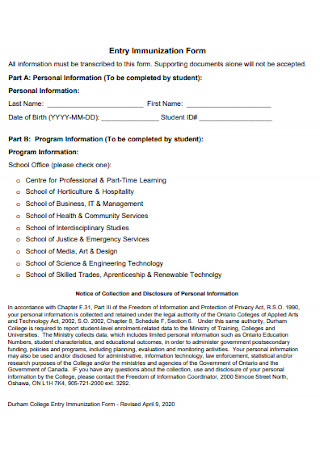
Entry Immunization Form
download now -

Proof of Immunization Compliance Form
download now -
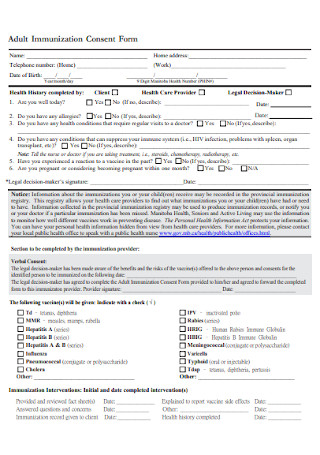
Adult Immunization Consent Form
download now -

Immunization Verification Form
download now -
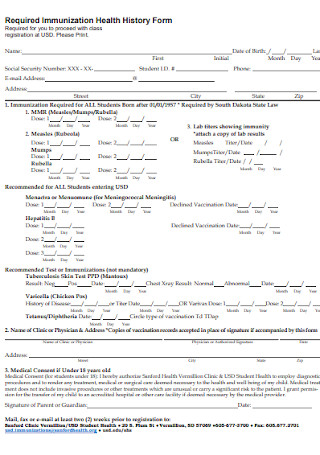
Immunization Health History Form
download now -

College Immunization Form
download now -
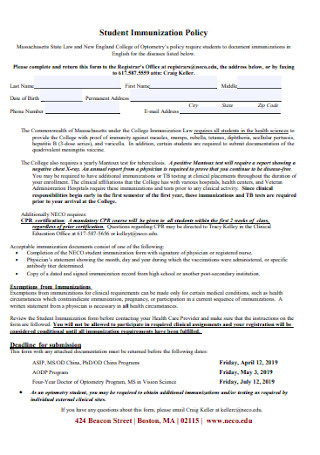
Student Immunization Policy Forma
download now -
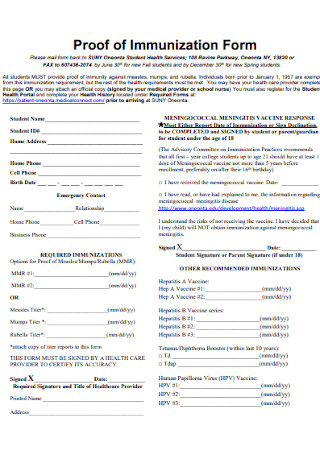
Proof of Immunization Form Template
download now -
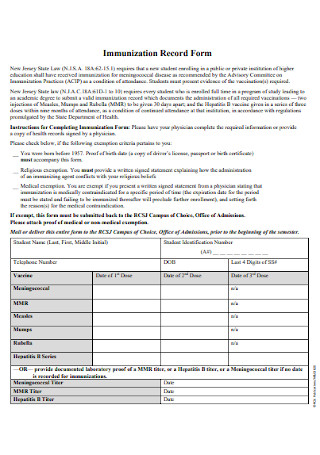
Immunization Record Form
download now -

Student Health Immunization Form
download now -
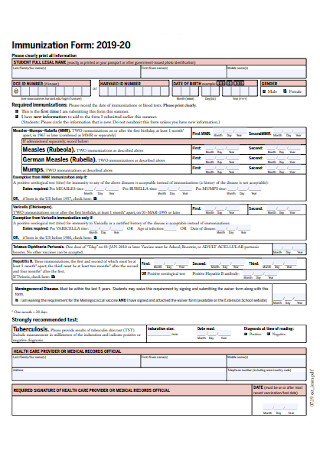
School Immunization Form
download now -
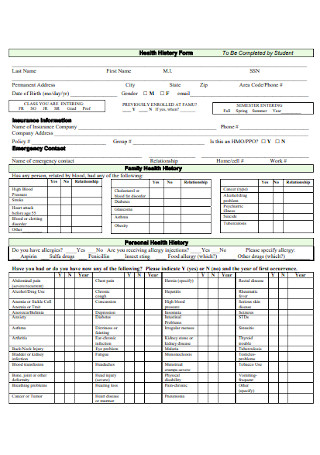
Health History Immunization Form
download now -
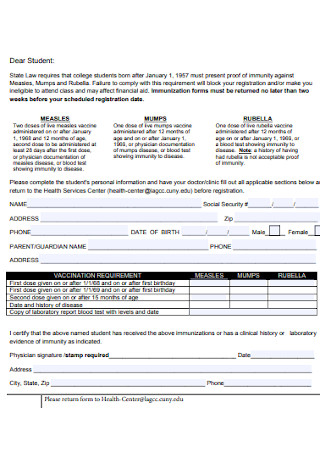
Student Immunization Schedule Example
download now -
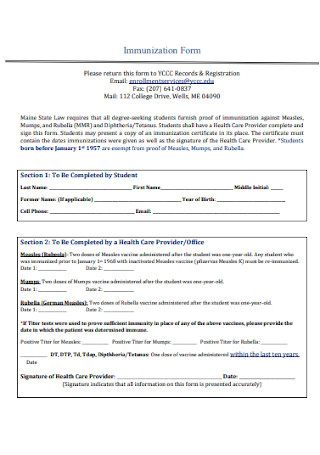
Community College Immunization Form
download now -

Academic Immunization Form
download now -
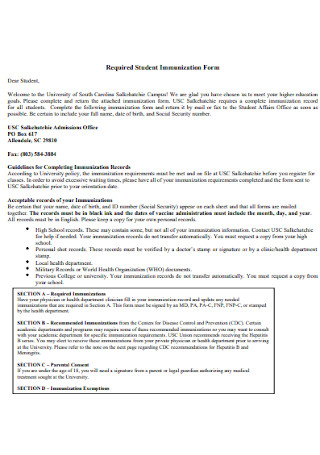
Required Student Immunization Form
download now -

Medical Report and Immunization Form
download now -

Travel Immunization Request Form
download now -
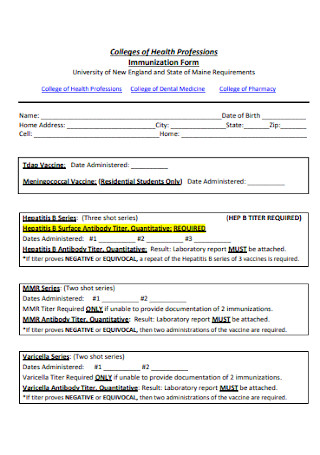
Colleges of Health Immunization Form
download now -
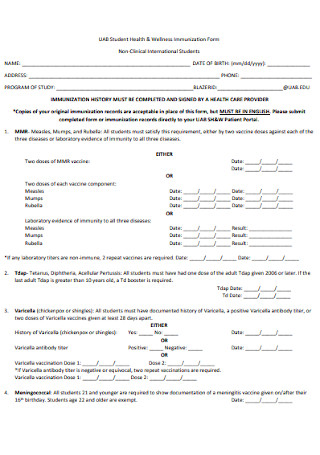
Wellness Immunization Form
download now -
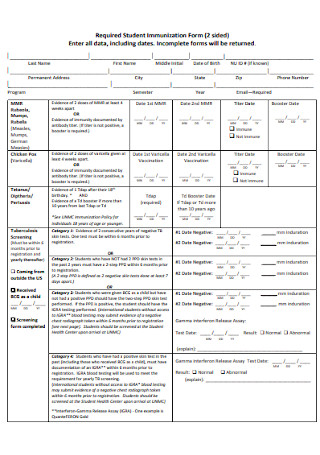
Required Student Immunization Form Template
download now -
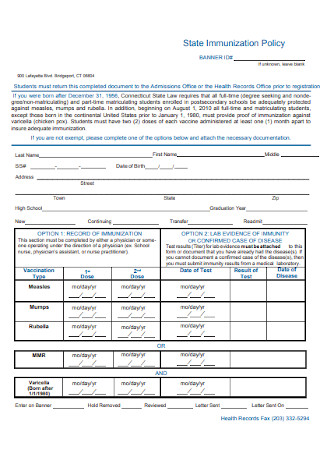
State Immunization Policy Form
download now -
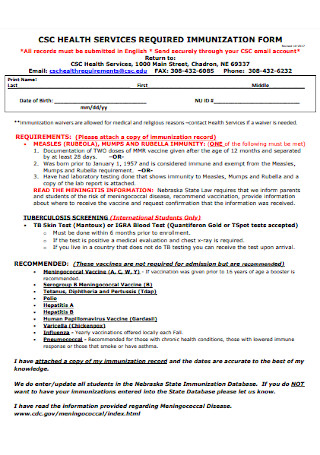
Health Service Immunization Form
download now -
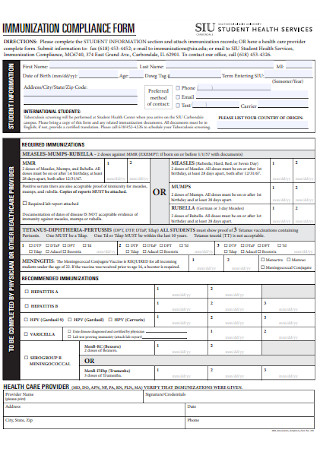
Sample Immunization Compliance Form
download now -
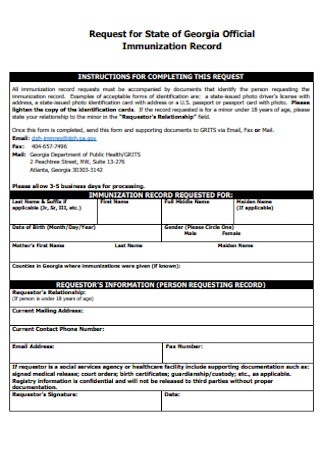
Official Immunization Form Template
download now -
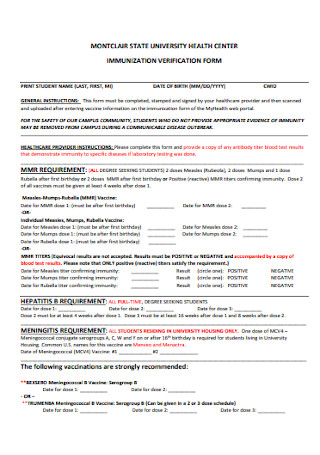
Immunization Verification Form Template
download now -

Proof of Immunization Compliance Form
download now -
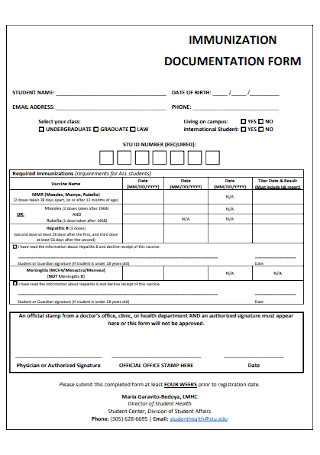
Immunization Documentation Form
download now -

College Student Immunization Form
download now -
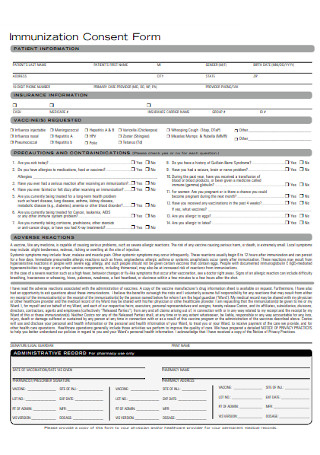
Immunization Consent Form
download now -
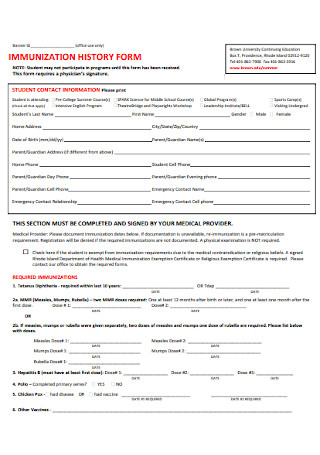
Immunization History Form
download now -
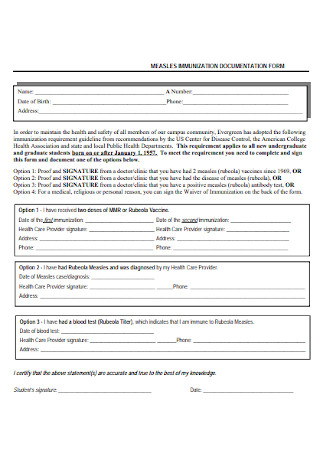
Measles Immunization Documentation Form
download now -

Immunization Form for Students
download now -
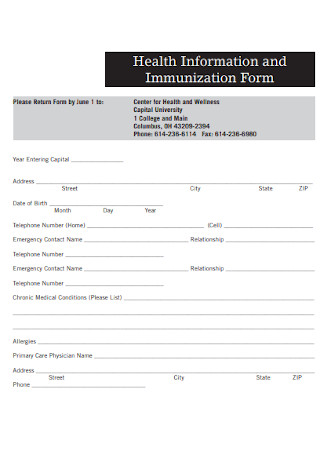
Health Information and Immunization Form
download now -
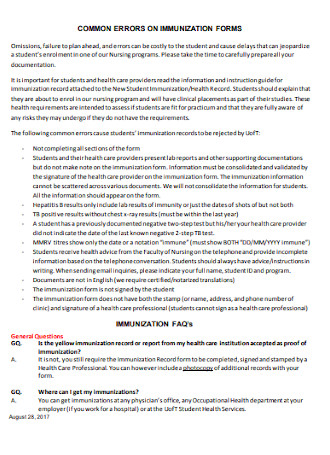
Common Errors onImmunization Form
download now
FREE Immunization Form s to Download
50+ Sample Immunization Forms
What Is an Immunization Form?
Information Found In an Immunization Record
How to Prepare For an Immunization Shot
Benefits of Immunization
FAQs
What is herd immunity, and how does it work?
Do immunizations cause autism?
What are the risks of not vaccinating?
Why is it necessary to maintain medical immunization records?
What Is an Immunization Form?
An immunization form, also known as an immunization record, is a document that details a comprehensive timeline of all the vaccinations that a person received. The timeline starts from infancy to the present. Several jobs, schools, colleges, universities, and travel require this document before initiating admission. A registered physician fills in the details of the immunization form, along with the parent or guardian. This document needs to be updated each time an immunization schedule is listed. It is also essential to be knowledgeable about the information on the form when the need arises.
According to the World Health Organization, more than 1 billion children worldwide underwent vaccination in the past ten years. Up until today, the World Health Organization is still campaigning for parents to get their children vaccinated.
Information Found In an Immunization Record
Like any other health record or declaration form, the information must provide accuracy and precision. Knowing the data in the immunization record helps primarily in organizing your medical history. Each immunization record is different. However, here is the list of information to look out for in an immunization record.
How to Prepare For an Immunization Shot
Some people are afraid of needles, and it is a concern most especially when taking an immunization shot. However, there are ways to overcome a quick vaccine administration. Here are some tips to help prepare yourself when taking a vaccine.
Step 1: Learn More about the Vaccine and How They Work
It is essential to have a background in the immunization program. Familiarize yourself with what the vaccine is and what it can do for you. Vaccines are safe and effective. The administration of the vaccine must be with your consent. Side effects of vaccines are common and a telltale sign that the body is working to combat the infection. Learning about how vaccinations work can encourage you to receive one.
Step 2: Learn About the Benefits of Getting a Vaccine
A vaccine is administered by healthcare professionals to help the body combat different diseases and infections. Find out what benefits it brings and the risks of not taking the vaccine. If you still have doubts, consult a medical practitioner and weigh out the benefits. It’s also advantageous to ask people who have received the vaccine reasons for getting vaccinated.
Step 3: Familiarize With the Immunization Schedule
The immunization schedule or vaccination schedule is a timetable listing a patient’s series of vaccinations. It includes the dates of vaccine administration. The schedules serve as a guide to maximize the effectiveness of vaccines and minimize the fatalities of lethal diseases by administering them to individuals based on methods.
Step 4: Plan and Prepare For the Vaccination
See if the vaccine is recommended for you right now. If you’re feeling under the weather, it is best to take the vaccine some other time. Make sure you are fit and in the best condition whenever receiving a vaccine. It is also best to consult a doctor before vaccination. Find out how you can receive the vaccine. Confirm if it is readily available in your vicinity, then book an appointment. It is also vital to know about the medical procedures and screening accompanying the vaccination. Some vaccines may require you to get blood tests and CT scans. Make sure to research what to do before, during, and after receiving an immunization shot.
Benefits of Immunization
Immunization, by definition, is a process of protection against a disease after a person is vaccinated. It applies to all people of all ages. Toddlers and children often get vaccinated at early stages, and here is why immunization is beneficial.
FAQs
What is herd immunity, and how does it work?
Herd immunity, also known as population immunity, is indirect protection of a community from transmittable illnesses either through immunization or acquired through previous infections. Although, mass vaccination is the best option in achieving herd immunity. Mass vaccination prevents the spread of the disease to the population, resulting in low transmission and mortality rate. For the people to attain herd immunity, a substantial number of the community need to be vaccinated. It is to reduce the overall amount of the virus reaching a larger population. The main goal of herd immunity is to protect the vulnerable groups in the community from disease.
Do immunizations cause autism?
Vaccines and vaccine ingredients do not cause autism. Autism spectrum disorder(ASD) is a developmental condition that affects the brain, causing significant behavioral, social, and communication challenges in children. The principal cause of autism is still unknown. However, several studies point to genetics and brain anatomy. In 2011, a report conducted by the Institute of Medicine showed that both children and adults show that the eight vaccines administered to them are safe. Despite the evidence, several people are still concerned about their children developing autism because of vaccines. According to the World Health Organization, 19.7 million children below one year did not receive primary vaccination.
What are the risks of not vaccinating?
It is important to remember that individuals can contract diseases from people that have no symptoms. Not wanting to get a vaccine will pose severe consequences on the individual as well as their surrounding. If you are not vaccinated, there is a high possibility of contracting diseases. Vaccines intend to combat particular diseases. However, if you are not vaccinated, you will catch the disease. It’s only a matter of when it will happen. There is a possibility that you spread the disease as well. Here is where the importance of herd immunity comes in. Imagine not being vaccinated and getting the disease without exhibiting symptoms. You go out and interact with others who are also not vaccinated. You are infecting them without their knowledge, and this cycle will continue resulting in massive infections. Finally, once you have contracted the disease or illness, you are subject to isolation, seeing as you can infect more people. Infections spread rapidly to people without vaccines. It is a risk not only to yourself but to your surroundings as well.
Why is it necessary to maintain medical immunization records?
It is necessary to maintain accurate and timely medical immunization records to ensure that the person needing a vaccine gets them and that a person with complete vaccination records does not receive excess doses. A patient receiving extra doses is costly to organizations, and it decreases adverse reactions to the vaccine. Healthcare workers that administer vaccines must indicate in the immunization form the date of vaccination, manufacturer, lot number, and expiration date, as well as their information. By doing so, both the individual and the health department will have a record of their immunization.
Illnesses and diseases are not always visible. They are also developing into hazardous and life-threatening instances. It is a duty to keep a healthy lifestyle to combat multiple diseases that come our way. You can start by eating the right food, exercising regularly, and taking supplements to boost the immune system. However, being vaccinated is a sure way to prevent severe illnesses from happening. If you have doubts about vaccination, it is better to do your research and consult medical professionals. Hearsay will not help you get the correct information about vaccines. Remember that vaccines not only protect you but also protects your family and the community. According to Ezekiel Emanuel, an American oncologist, “Vaccines are the most cost-effective health care interventions there are. A dollar spent on a childhood vaccination not only helps save a life, but greatly reduces spending on future healthcare.” Start the journey into a safe future for yourself and your family. Check out the immunization form samples above and schedule your appointment now.
